Death of a Book CatThe Dark Side of Bookselling,
by Craig Stark #168 5 July 2013 |
Some things are easy to write about, others not so much. I don't know which this is ... yet, but it feels like a story I'm being told to tell.
My cat Ziggy died this week. It was not sudden but a week's long ordeal. I know from years experience on bookseller's forums that cats are, for whatever reason, something that just go with books. They inhabit bookstores everywhere, not to mention book rooms in online bookseller's homes ... and until recently Ziggy was my constant companion in my book cottage. Maybe an examination of this cat/book phenomenon would be a fine idea for an article sometime, but for now let's just agree that it's how things are.
Booksellers with cats, consequently, far outnumber those without, and if you want to get inundated with attention on a forum, just post something about your sick cat. Or better, one that died. Empathy, to say the least, abounds. Some of you on eBay's BSB may know a certain bookseller whose cat lived into its 30's. Imagine, if you can, meeting a death like that. For Ziggy, however, it was much different - a startlingly brief eight months.
He was eight weeks old when I brought him home, a pound or so wriggling with life in my hands, already displaying the telltale, striking features of a Bengal. At first I was going to call him Zig, but I soon discovered that you just don't call a tiny kitten a big-guy name. It was Ziggy, and I would gladly await his maturity (at a possible 30 pounds, the breeder said) for the transition to Zig the Invincible.
For those of you who don't know, Bengals are descendants of an initial crossbreeding between an Asiatic leopard and a domestic cat, often a Main Coon, and when the resulting litter is further bred with domestic cats, by generation four or five - termed F4 and F5 - the cats are far enough removed from their leopard ancestry to make good pets and yet not so far removed as to not retain their markings. Ziggy was an F5. A sweet spot, you could say.
He did not come cheap. It's really not like me to pursue expensive stuff for its own sake, but there was a reason this time. Most Bengals are hypoallergenic. If you or somebody you live with is allergic to cats or doesn't want to put up with shedding, Bengals are just the ticket. Though I don't mind, nor am I allergic to, any cats, this was something my wife could live with, the only thing she could live with: It was either a Bengal or no cat at all. I liked that I could hold him with a black shirt on.
Even then, as a kitten, Ziggy had one stunning feature - a golden nose. If you looked closely at the individual strands of hair that covered it, you'd swear that they were threads made out of gold.
As he grew, his nose became even more beautiful, almost glowing. And boy he did grow, reaching seven pounds in a few weeks. Well on his way, I thought, to major-cat presence.
He was shy at first and mostly hid under a bed, coming out only when he thought it was safe to eat or use his litter box. Acting upon what turned out to be some very good advice, I lay
down on the floor next to the bed one day and held out my hand, prepared to wait as long as it took for him to come to me. I don't remember how long it did take - I was told that it could
take hours, even hours spent over days - but it turned out to be something much less than an hour. I guess I was lucky.
After this, Ziggy adapted quickly to my book cottage in the back yard, soon feeling comfortable enough - and perfectly entitled (we are talking about a cat, remember) - to pretty
much get into and jump up on everything he felt like. To his credit, he never destroyed a single book. Once I caught him gently nibbling on the corners of the early 18th-century, 3-volume
Peter Jackson issue of Syria: The Holy Land & Asia Minor Illustrated, but the corners were already worn through, and it was really my fault for leaving books on the floor in the first place.
Always, with him, it was good-natured, harmless fun, fetching foam mice I threw, darting in and out of book aisles chased by invisible demons and taking 8-foot long, leopard-ly leaps
into my lap (and sometimes staying) when I picked up a bag of treats and shook it.
Ziggy's favorite thing, however, was spending time on the screened porch off the main book room. Here he had three wide-open views to a leafy universe teeming with birds, bugs, squirrels, and more.
If you can picture a bat spread-eagle on the wall of a cave, that's what Ziggy looked like when he climbed a screen after a lizard, doubtless muttering to himself, "Now what do I do?"
Of course, you can't not deeply love an animal you spend entire days with, almost on the first day, but with cats, how do you ever tell if it's reciprocal? Somebody whose keen perception of animals I greatly admire once told me that dogs express affection by wagging their tails (of course), but cats do it by ... blinking. Hard blinking. Eyes closed for a long moment. At the time, I had never heard this before, let alone associated blinking with affection. But then, when returning to the cottage from the house one afternoon, there was Ziggy waiting for me on the porch. I called out to him when I came near, and it happened - that heart-stopping, hard blink. How do you not beam back?
At about the six-month mark, I did something I wish I could take back. For reasons I don't want to get into here, let me just say that I made an appointment for him to be neutered - and de-clawed.
Neutering was no big deal; de-clawing turned out to be major. Bengals are especially prone, I know now, to having trouble with it. Their foot structure is different than that of most domestic
cats, some would say altogether unsuitable for the procedure; and their identities are much more tied up with having claws, who knows why; perhaps it's something to do with their generationally
closer relationship to wildness. I realize that pleading ignorance of these facts means nothing here, but I'm putting this out as a public apology to people who know better and legitimately expect the rest of us to find out what's what before making this kind of move.
In any case, Ziggy was reluctant to walk on his front feet after the surgical fact, his left foot especially, and he took to hopping on his right foot rather than putting weight on his left. His appetite declined as well, and his paws seemed too sensitive to bat foam mice around - and frankly, playing didn't seem to interest him much at all anymore. More trips to the vet commenced at this point, and there were x-rays and several different pain meds and so on, nothing of which seemed to either reveal what was going on or make things better. The vet said it was probably nerve-ending sensitivity, and he would just have to work it out over time.
But then - he ate even less, lost more weight. At one point I had what I thought was a bright idea: Take charge of the situation, speed up the working-it-out process. Feline physical therapy, sort of.
On one side of our house there is a long, ceramic-tiled hallway broken into three perpendicular runs, maybe 15 yards in all. Ziggy didn't like tile, and I used this to force him to exercise,
shutting all the hallway doors, setting him down at the back of the house and calling him to the family room. It worked every time, but after a few days of this, several sessions a day, things
weren't improving at all, and meanwhile, new things came up: He was eating almost nothing now, and on occasion he wouldn't use his litter box. The latter seemed understandable, given his
sensitive feet, but the former alarmed me enough to take yet another trip to the vet, especially since he also felt warm.
A blood test showed no abnormalities, so onto a specialist, who conducted a sonogram. Talk about things that don't come cheap. Vets have pretty sophisticated
technology available to them now, and while I guess this is great for diagnostic purposes and improving treatment outcomes, it's a much bigger hit to your wallet than it was even a few
years ago. Anyway, the sonogram suggested two possibilities - an inoperable mass wrapped around a major artery or a fluid build-up indicative of something called FIP (feline infectious
peritonitis). Nothing at all to do with the de-clawing! I wasn't alarmed when I heard "FIP" because I had no idea what it was. The vet explained that it was a condition
caused by a virus infecting cats with genetically weakened immune systems. Though not common, if it came up, it was usually in a cat that had come from a cattery situation, like a breeder,
and it most often arose in cats Ziggy's age. Worse, it was untreatable. A final examination revealed that it was indeed FIP. They kept him for several days to bring down his fever
with antibiotics and tube feed him. He improved a little but the prognosis, as they say, was grim.
I picked him up on a Friday morning and left with a bottle of steroids (for inflammation) and a large syringe for force-feeding and hydration. My instructions were to observe him and call in if necessary. I was assured that he wasn't suffering but experiencing a sort of malaise. He hated the force feeding, which took place with him on his back and the scruff of his neck held tightly, and he grew more and more uncooperative. Despite being fed twice a day, he lost more weight. His hips became considerably more pronounced, and you could feel his vertebrae in bold relief. He had stopped hopping, finally, but when he walked, which he didn't do often, it was more like hobbling, struggling to stay balanced. The steroids had no visible effect. Inside the house, he began to spend most of his time under the bed again, as he had done those first days.
But I made a point to take him out to the cottage every day. Being alone under a bed, I decided, was no way to go through this. Occasionally he would purr or turn on his back to have
his belly rubbed, but there seemed to be no real play left in him. He sat or slept inside most of the day, only occasionally going out on the porch - and once slept next to my shoes:
As for me, I was now waiting for that moment of knowing that comes when it's ... time, watching, hoping again and again for any moments of pleasure left in him that could justify
delaying the inevitable. Meanwhile, there was almost nothing else I could do but look at him 50 or more heartbreaking times a day. I've lived with cats more or less all my life, but this was
the first time I lived intimately with a cat's prolonged death. Oddly, though heavy and unrelenting at first, seeming to put life itself on hold, it grew less so and more peaceful as the end drew near.
One day, inexplicably, Ziggy picked up a foam mouse next to a bookcase near my desk and carried it into a dark book aisle. He lay down and slept with it. I left it there in case he wanted to return. He never did. I'm not sure why, but for me this was the hardest thing.
On the morning of the 12th day there was a significant change. He was moving around a lot, alternately sitting in what had been his favorite spots, including a lookout post on the porch - almost as if reminiscing on what had been. But it was obvious that he wasn't staying put because he couldn't find a place to get comfortable. His belly was swollen now, and I knelt down on the floor and looked into his eyes. His mouth opened ever so slightly and, after a moment, a faint meow came. Then a sort of rattling purr when I petted him.
The Cemetery
A few months ago I purchased, of all things, a statue at an estate sale - a book cherub. You may recall it from a recent article:
I had never in my life purchased a statue before, not once even contemplated it, but for some reason it was something I knew I needed to buy when I came face to face with it. Instinct shouts at me now and again, always for a good reason, I now know, though at the time I rationalized it as being book related. And besides, I liked how it looked outside the cottage. When I showed it to my wife, the first thing she said was, "It looks like something that belongs in a cemetery."
So, now I have a small cat cemetery next to my book cottage, presided over quietly by a book cherub. There is no fence around it, no surveyed plots within, and no entrance nor exit. And only one unmarked grave for a golden-nosed little guy who never got the chance to grow up. It's in a wooded area that gets only intermittent sunlight during the day, much less light under a moon, and this of a filtered, more subdued bathing that reminds me of a line in John Denver's "Rocky Mountain High": " ... shadow from the starlight is softer than a lullaby...." For a long time I didn't know what this meant, but years later I heard him explain in an interview that there existed high, remote places in the Rocky Mountains where the air is so clear that, on moonless nights, stars cast faint shadows.
Centuries earlier, for poetic purposes, Wm. Blake drew a qualitative distinction between direct light from, say, the sun - a source that glows within and emanates light without -
and that of the moon - an indirect source that reflects back the sun's beauty. I was sitting next to Ziggy, my hand on his back, when the vet injected him, his eyes wide, wide open,
passing from life to death, looking eternity unblinkingly in the face, even after his heart stopped. The 7-pound, exuberant sun that was him for a brief but golden interlude in my life is
gone; the moon shadows that now sleep sweetly outside the cottage at night will forever hold his hard-blinking gift to me on earth. Thank you for leaving this with me when you left, my buddy. I'll miss you.
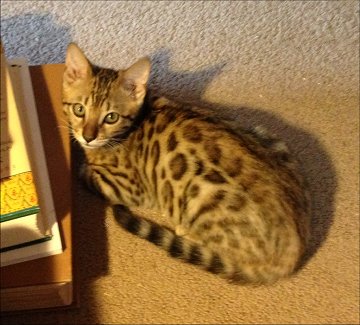
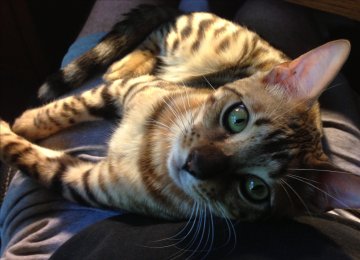
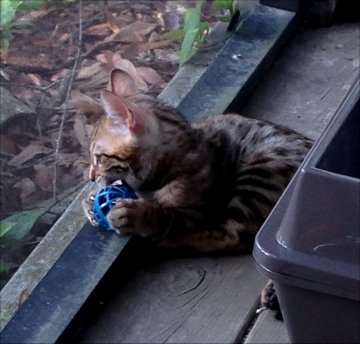
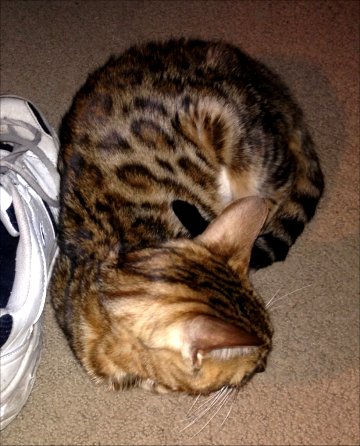
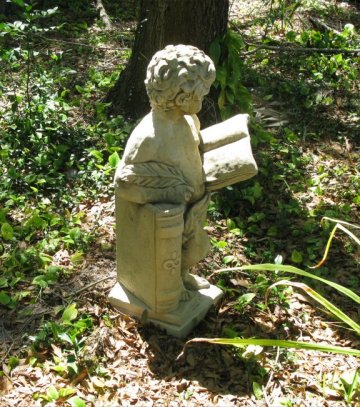
Copyright 2003-2013 by BookThink LLC